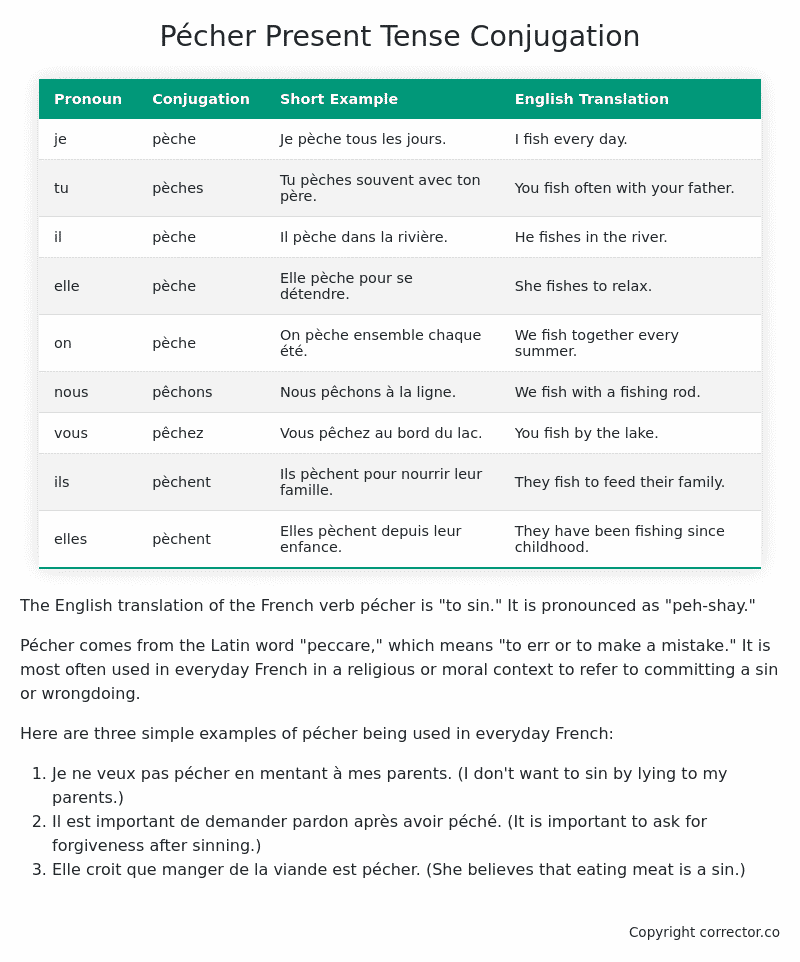Le Present (Present Tense) Conjugation of the French Verb pécher
Introduction to the verb pécher
The English translation of the French verb pécher is “to sin.” It is pronounced as “peh-shay.”
Pécher comes from the Latin word “peccare,” which means “to err or to make a mistake.” It is most often used in everyday French in a religious or moral context to refer to committing a sin or wrongdoing.
Here are three simple examples of pécher being used in everyday French:
- Je ne veux pas pécher en mentant à mes parents. (I don’t want to sin by lying to my parents.)
- Il est important de demander pardon après avoir péché. (It is important to ask for forgiveness after sinning.)
- Elle croit que manger de la viande est pécher. (She believes that eating meat is a sin.)
Pécher – About the French Present Tense
To take a deep dive into all the French tenses then see our article on Mastering French Tense Conjugation.
Common Everyday Usage Patterns For Le Present
Interactions with Other Tenses
Table of the Present Tense Conjugation of pécher
| Pronoun | Conjugation | Short Example | English Translation |
|---|---|---|---|
| je | pèche | Je pèche tous les jours. | I fish every day. |
| tu | pèches | Tu pèches souvent avec ton père. | You fish often with your father. |
| il | pèche | Il pèche dans la rivière. | He fishes in the river. |
| elle | pèche | Elle pèche pour se détendre. | She fishes to relax. |
| on | pèche | On pèche ensemble chaque été. | We fish together every summer. |
| nous | pêchons | Nous pêchons à la ligne. | We fish with a fishing rod. |
| vous | pêchez | Vous pêchez au bord du lac. | You fish by the lake. |
| ils | pèchent | Ils pèchent pour nourrir leur famille. | They fish to feed their family. |
| elles | pèchent | Elles pèchent depuis leur enfance. | They have been fishing since childhood. |
Other Conjugations for Pécher.
Le Present (Present Tense) Conjugation of the French Verb pécher (this article)
Imparfait (Imperfect) Tense Conjugation of the French Verb pécher
Passé Simple (Simple Past) Tense Conjugation of the French Verb pécher
Passé Composé (Present Perfect) Tense Conjugation of the French Verb pécher
Futur Simple (Simple Future) Tense Conjugation of the French Verb pécher
Futur Proche (Near Future) Tense Conjugation of the French Verb pécher
Plus-que-parfait (Pluperfect) Tense Conjugation of the French Verb pécher
Passé Antérieur (Past Anterior) Tense Conjugation of the French Verb pécher
Futur Antérieur (Future Anterior) Tense Conjugation of the French Verb pécher
Subjonctif Présent (Subjunctive Present) Tense Conjugation of the French Verb pécher
Subjonctif Passé (Subjunctive Past) Tense Conjugation of the French Verb pécher
Subjonctif Imparfait (Subjunctive Imperfect) Tense Conjugation of the French Verb pécher
Subjonctif Plus-que-parfait (Subjunctive Pluperfect) Tense Conjugation of the French Verb pécher
Conditionnel Présent (Conditional Present) Tense Conjugation of the French Verb pécher
Conditionnel Passé (Conditional Past) Tense Conjugation of the French Verb pécher
L’impératif Présent (Imperative Present) Tense Conjugation of the French Verb pécher
L’infinitif Présent (Infinitive Present) Tense Conjugation of the French Verb pécher
Struggling with French verbs or the language in general? Why not use our free French Grammar Checker – no registration required!
Get a FREE Download Study Sheet of this Conjugation 🔥
Simply right click the image below, click “save image” and get your free reference for the pécher Present Tense tense conjugation!

I hope you enjoyed this article on the verb pécher. Still in a learning mood? Check out another TOTALLY random French verb present conjugation!


